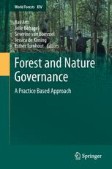Search
Search Results
-
Introduction to Qualitative Research in Healthcare Simulation
In this chapter, we introduce and illustrate features of qualitative research through published healthcare simulation literature. We also outline key...
-
Aesthetic education revised: a contribution to mobile learning in physical education
The purpose of this study was to empirically capture the sociocultural practices of young people who have used mobile digital technologies in...

-
Naturally Occurring Data: Conversation, Discourse, and Hermeneutic Analysis
Simulation provides unique and individual learning experiences. Research methods that assist in understanding such experiences can be particularly...
-
How Can the Study of the Humanities Inform the Study of Biosemiotics?
This essay – a collection of contributions from 10 scholars working in the field of biosemiotics and the humanities – considers nature in culture. It...
-
Potentials of Forestry Extension Encounters: A Conversation Analysis Approach
This article assesses co-operative features of forestry advising encounters with an emphasis on their pedagogical positioning. The study argues that...
-
Forest market governance: exploring a practice-based approach
Market governance – the use of the market mechanism in governance processes – has become highly popular. The enthusiasm for market-oriented...
-
How do Forest Markets Work? Exploring a Practice Perspective
Over recent decades, it has become highly popular to use markets in governance processes. Enthusiasm for market-oriented approaches has become so...
-
Interaction studies in Japanese primatology: their scope, uniqueness, and the future
This paper aims to review social interaction studies in Japanese primatology, in order to introduce their utility into the current framework of...
-
Collapsing the Wave Function of Meaning: The Epistemological Matrix of Talk-in-Interaction
Devoted to an explication of how interacting agents mutually and micro-temporally provide for each other the grounds for immediate next action in the...
-
Bridging the divide in urban sustainability: from human exemptionalism to the new ecological paradigm
This paper reviews the main bodies of contemporary urban sustainability theory. From this analysis, two underpinning paradigms of urban...
-
Scientific Knowledge and Participation in the Governance of Fisheries in the North Sea
The participatory mode of fisheries governance is based on effective communications that are able to bring together the viewpoints of many...
-
Fisheries Co-Management and the Knowledge Base for Management Decisions
Two objectives of community-based fisheries co-management are to make management more equitable and more rational, and both of these objectives are...
-
Information Systems, Cognitive Science, and Artificial Intelligence
This final chapter of applications will look at two related areas: computer-based information systems (IS), and cognitive science and artificial...
-
Needs as Analogues of Emotions
It is becoming increasingly evident that if needs theory is to prevail as a viable part of social theory it must have an ontological grounding which...
-
The Communicative Bases of Social Inequality
The experience of the last decade has shown that in spite of extensive legislation and positive efforts on the part of public agencies and industry,...
